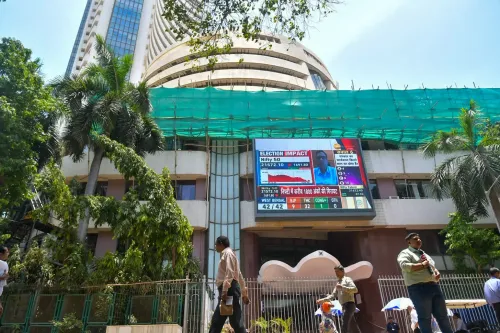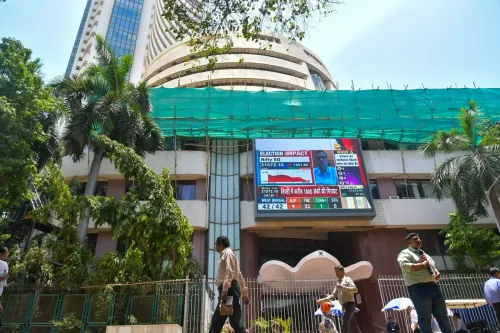Did Sensex and Nifty Rise Due to Eased Inflation and Tensions?

Synopsis
Key Takeaways
- Indian stock market opened higher on positive inflation news.
- Retail inflation fell to a multi-year low of 3.16%.
- Midcap and smallcap stocks showed significant gains.
- All sector indices were in the green.
- Investor sentiment is boosted by reduced geopolitical tensions.
Mumbai, May 14 (NationPress) The Indian benchmark indices commenced trading on a positive note on Wednesday as retail inflation hit a multi-year low and geo-political tensions diminished.
By approximately 9:25 am, the Sensex had climbed by 414 points or 0.51 percent, reaching 81,562, while the Nifty was up 136 points or 0.55 percent, standing at 24,712.
There was a noticeable increase in the midcap and smallcap stocks. The Nifty midcap 100 index rose by 510 points or 0.92 percent, now at 56,030, and the Nifty smallcap 100 index gained 132 points or 0.78 percent, reaching 17,035.
Sector-wise, all indices were in the positive zone, with Auto, IT, PSU bank, FMCG, metal, energy, infrastructure, and PSE sectors leading the gains.
“Following a positive opening, the Nifty may find support at 24,500, with subsequent levels at 24,400 and 24,300. On the upside, 24,700 serves as immediate resistance, followed by 24,800 and 24,850,” explained Hardik Matalia from Choice Broking.
In the Sensex roster, major contributors to the rise included Tata Steel, Bharti Airtel, Tech Mahindra, Infosys, Eternal, HCL Tech, M&M, Bajaj Finserv, L&T, TCS, SBI, and NTPC. Conversely, Tata Motors, Asian Paints, IndusInd Bank, HUL, Nestle, and Kotak Mahindra Bank faced declines.
Previously, India’s retail inflation dipped to 3.16 percent in April from 3.34 percent in March, marking its lowest level since July 2019.
“With crude oil prices significantly declining, a softer domestic demand, and food prices under control, we anticipate the RBI will pursue aggressive rate cuts,” remarked Devarsh Vakil, Head of Prime Research at HDFC Securities.
Asian stock markets displayed a mixed performance. Hong Kong, Shanghai, Seoul, and Jakarta were in the green, whereas Japan and Bangkok faced losses.
On Tuesday, US markets closed with mixed results. The primary index, Dow Jones, ended lower, while the technology index, Nasdaq, recorded gains for the second consecutive day following softer-than-expected inflation figures.
On May 13, foreign institutional investors (FIIs) sold equities worth Rs 476 crore, while domestic institutional investors (DIIs) continued their purchasing spree, acquiring equities worth Rs 4,273 crore on the same day.








